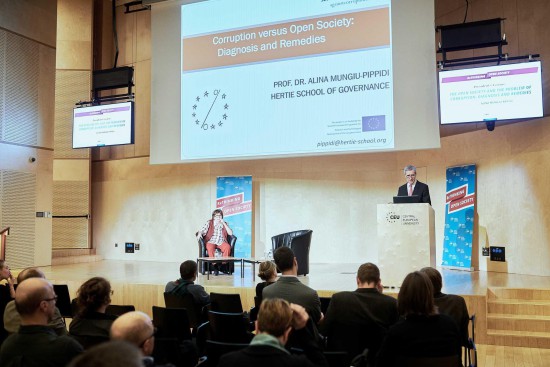Simple Rules and Transparency Key to Reducing Corruption, Says Mungiu-Pippidi
Low levels of regulation, minimal government intervention, and transparency are essential to reducing corruption, but can only be effective in a society where an independent media and judiciary can empower active citizenship, said Alina Mungiu-Pippidi, who chairs the European Research Centre for Anticorruption and State-Building (ERCAS) at Hertie School of Governance. Mungiu-Pippidi delivered her lecture as part of the Rethinking Open Society series at CEU.
“One could even say that the single most serious threat to an open society is corruption,” CEU President and Rector Michael Ignatieff said in introducing Mungiu-Pippidi. Ancient Greek and Roman thinkers “even thought that corruption could destroy a free society.”
Nevertheless, corruption is not a focus in academia or in fact in government statistics, Mungiu-Pippidi said in her lecture, entitled “The Open Society and the Problem of Corruption: Diagnosis and Remedies”.
“It might seem surprising, but the topic of corruption is not present in any discipline,” she said. “The Oxford textbook on governance, that is a few years old, does not mention the word corruption once. If you ask me how competitive procurement is in Europe, I cannot tell you, states build statistics in a way to shield themselves from such enquiries.”
People in Europe are aware of the problem, however. According to Eurobarometer, two-thirds of EU citizens think that connections explain success in the public and private sector. “People are on our side, and anti-corruption parties and movements are gaining momentum all over the world, even in countries where talking about such topics is dangerous,” said Mungiu-Pippidi. One recent breakthrough was the sweeping victory of an anti-corruption party in India.
There have been institutionalized efforts at reducing corruption, with both the U.S. and the EU spending billions of euros on promoting the rule of law. In both Turkey and Iraq, the billions spent have failed to make a difference.
To find an effective solution, Mungiu-Pippidi developed a unified theory of corruption that makes it possible to measure corruption before and after anti-corruption efforts are made, and set actionable fact-based indicators. First, she looked at the current statistics, and found that most widely accepted World Bank indicators are based on a large number of very different sources. In fact, many indicators are so close that they seem to measure the same thing. “‘Control of corruption’ and ‘rule of law’ seem to show the same results for each country,” she said. “Without addressing government effectiveness and the rule of law, corruption cannot be fixed. That is why I say that corruption is not only everywhere, but it is also ‘everything.”She also found that there are twice as many corrupt democracies as autocracies.” This shows that democratization is only the first step in controlling corruption, and not sufficient in itself,” she said. “It is also clear that a governance regime – how resources are allocated – is much more difficult to change than the political regime.”
In Mungiu-Pippidi’s theory, the corruption scale has two end points. On one are the corrupt particularistic societies, where access to services, careers, and resources is limited, and the state extracts from the many and distributes it to the few. At the other end is ethical universalism, where services are openly accessible to all.
“Asking a citizen whether s/he can get a certain service without a connection in their country very clearly positions that country on this scale,” Mungiu-Pippidi said. There are other methods she uses to measure corruption. The main factors she looked at in measuring the corruption in Romania for example, are the number of public tenders with only one bidder, the political connections of the companies winning the tenders, and agency capture, where the public agency awards the majority of the contracts to one bidder. According to these and other direct and indirect measurements, Mungiu-Pippidi identified seven countries that have succeeded in reducing corruption; Estonia, Uruguay, Chile, Costa Rica, Botswana, Georgia, South Korea, and Taiwan.
“At least two of these are debatable, but the fact that the South Korean president had to resign shows that in these countries, normative constraints have become strong enough to ensure sustainability,” Mungiu-Pippidi said.
Regarding Estonia, one of the biggest success stories, Mungiu-Pippidi said that the key was building a merit-based state with simple rules and administration, very little government intervention, and extensive digitalization.
Romania, Bulgaria and Macedonia have extraordinarily advanced anti-corruption policies, but it does not show in their performance. According to Mungiu-Pippidi, anti-corruption agencies that are often recommended as a go-to solution perform similarly badly, especially in less-developed countries, where ruling parties and governments use them to attack their political enemies. “In my approach at reducing corruption, transparency has a key role to play,” she said. “Regulating party finances has for example only created new problems, resulting in a situation where money moved in briefcases. Let party donations become legal, but make them transparent.” In her model, she strives to achieve an equilibrium between resources and constraints. “The effect of fiscal transparency in reducing corruption increases threefold if it is enhanced by a civil society and a free press,” she said, adding that combining these factors with an independent media and jurisdiction can have a lasting positive effect on controlling corruption. “We could use citizen’s connections to increase transparency. We are trying to move this forward at ERCAS by creating online databases like opentender.eu that will launch in 2018, or the Index of Public Integrity,” she said.
31 October 2017
Disclaimer: All views, opinions and accounts included in the RAI News Section are those of the authors; their inclusion does not imply official endorsement or acceptance by RAI. The News Section reflects the selection of topics of informative value to the organization and its stakeholders. Its content is taken from press/media sources and does not in any way reflect official RAI Secretariat policy. RAI Secretariat is not responsible for possible inaccuracies in media reports.

